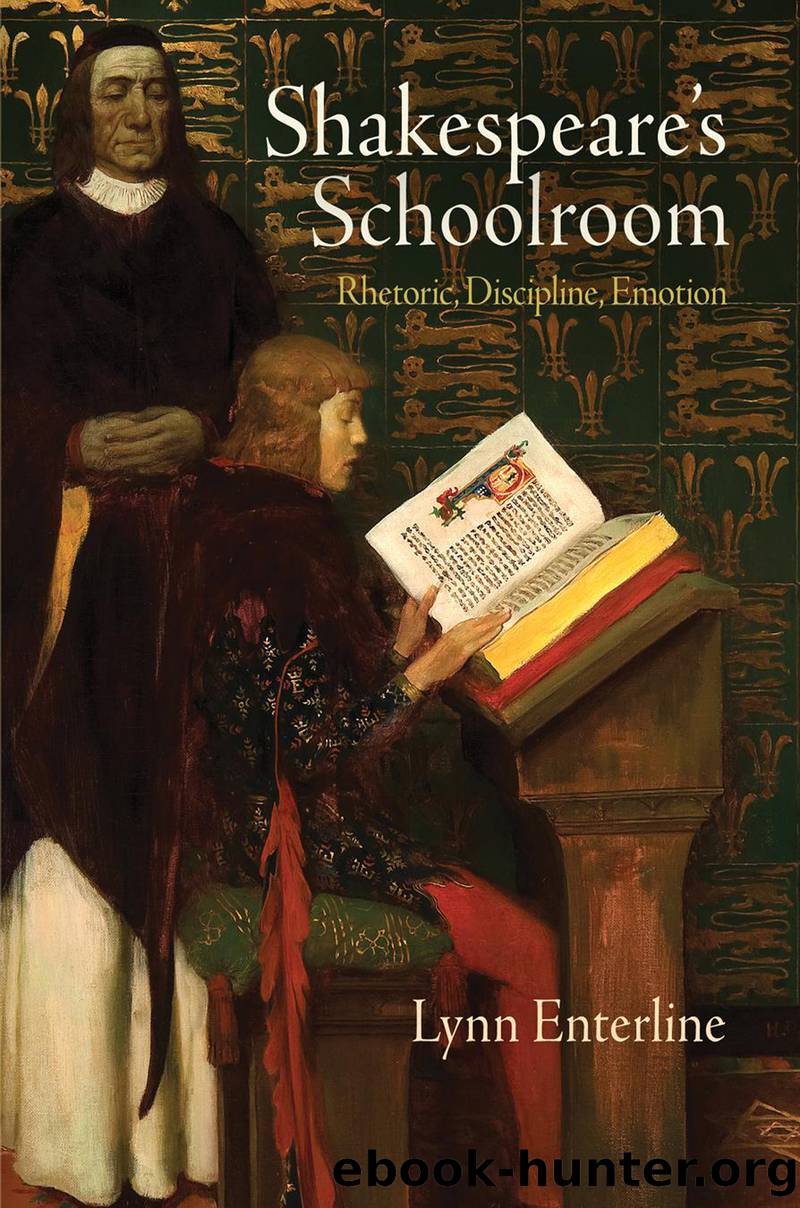Shakespeare's Schoolroom by Enterline Lynn;

Author:Enterline, Lynn;
Language: eng
Format: epub
Publisher: University of Pennsylvania Press
Published: 2012-08-15T00:00:00+00:00
Dost Thou Love Pictures?
The intimate connection between âloveâ and âmasteryâ that pervades Lucentioâs translation lesson, as well as Lilyâs inaugural example of the accusative case, surfaces in a slightly different way in the Induction; once again, Ovidâs precedent paves the way. When the Lord tries to translate Christopher Sly from âa beggar and a tinkerâ into âa Lord and nothing but a lordâ (Induction 1.2.61) he puts another Ovidian representation of desire into service. The Lordâs âjestâ on Sly reminds us of humanist social aspirationsâthat schoolmasters intervened in social reproduction in order to train young boys up the ladder of social rank (with an eye, of course, to improving their own standing). The Lordâs final and most effective technique for inducing Christopher Sly to believe he has risen above his former social position (beggar, cardplayer, pedlar, and tinker) is to describe a series of erotic pictures drawn from Ovidâs Metamorphoses. That is, if Sly is to move up to the status of âmighty Lord,â he must learn a lesson in classical desire.
In addition to flaunting the attractions of the cross-dressed Page, and therefore reminding us of sixteenth-century theatrical as well as school practice, the Lordâs trick betrays something of its institutional genealogy because changing Slyâs social status is negotiated not simply in relation to the classical past, but in relation to imitations of it that are elaborately framed as such. The several servants perform their parts under the watchful eye of their master, vying to fulfill the âinstructionsâ he has set them by trying to âpersuadeâ Sly into a new sense of himself (1.124). Before hearing the âwanton picturesâ described so well, Sly speaks in prose and truculently clings to name, geography, education, and profession as fixed marks of identity:
âWhat, would you make me mad? Am not I Christopher Sly, old Slyâs son of Burton-heath, by birth a pedlar, by education a card-maker, by transmutation a bearheard, and now by present profession a tinker?â (Induction.2.16â22)
The deciding fiction that prompts his transformation upward follows from the query, âDost thou love pictures?â Two servingmen and the Lord cooperate in performing an ekphrastic depiction of three scenes from the Metamorphoses which offer Sly the chance to see the âloves of the gods.â After the ekphrasis, he begins to speak in verse with new questions about who âIâ am:
Am I a lord and have I such a lady?
Or do I dream? Or have I dreamâd till now?
I do not sleep: I see, I hear, I speak;
I smell sweet savors and I feel soft things.
Upon my life, I am a lord indeed,
And not a tinker, nor Christopher Sly.
Well, bring our lady hither to our sight,
And once again a pot oâ thâ smallest ale.
(1.2.68â75)
At first glance, his transformation mocks the humanist effort to âtrainâ young men âupâ the social ladder by way of a classical education: Ovid substitutes for a former lesson in âcard-making,â and Sly still hankers after âsmall ale.â Indeed, the Latin epic so prominent in school curricula comes on stage as âwanton picturesââmore in the guise of early modern pornography than worthy exemplar.
Download
This site does not store any files on its server. We only index and link to content provided by other sites. Please contact the content providers to delete copyright contents if any and email us, we'll remove relevant links or contents immediately.
The Power of Myth by Joseph Campbell & Bill Moyers(1046)
Half Moon Bay by Jonathan Kellerman & Jesse Kellerman(977)
Inseparable by Emma Donoghue(971)
A Social History of the Media by Peter Burke & Peter Burke(966)
The Nets of Modernism: Henry James, Virginia Woolf, James Joyce, and Sigmund Freud by Maud Ellmann(888)
The Spike by Mark Humphries;(804)
The Complete Correspondence 1928-1940 by Theodor W. Adorno & Walter Benjamin(772)
A Theory of Narrative Drawing by Simon Grennan(771)
Culture by Terry Eagleton(768)
Ideology by Eagleton Terry;(729)
World Philology by(710)
Farnsworth's Classical English Rhetoric by Ward Farnsworth(705)
Bodies from the Library 3 by Tony Medawar(700)
Game of Thrones and Philosophy by William Irwin(699)
High Albania by M. Edith Durham(695)
Adam Smith by Jonathan Conlin(684)
A Reader’s Companion to J. D. Salinger’s The Catcher in the Rye by Peter Beidler(674)
Comic Genius: Portraits of Funny People by(642)
Monkey King by Wu Cheng'en(640)
